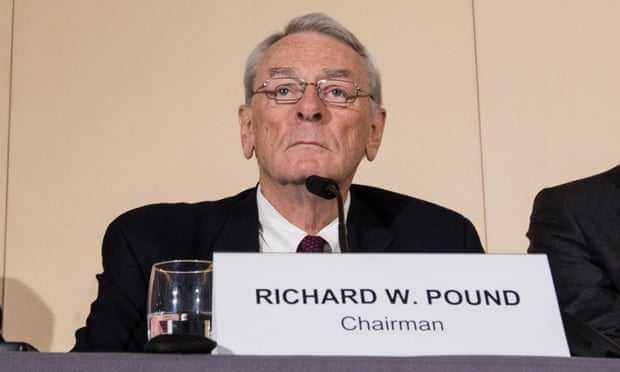Richard "Dick" Pound is a giant in the international sports movement. He has been outspoken, at times, and has led numerous investigations into sporting corruption, including the Olympic bidding scandal of the 1990s and most recently into the corruption in the IAAF. Sport is invariably better for his long term service.
But at the same time, Pound's recent statements related to IAAF are puzzling, not least because what he is saying in interviews is directly contradictory to the WADA Independent Commission reports on the IAAF that he recently led.
An interview published today with Athletics Illustrated raises all sorts of questions. (Last week Ross Tucker
@scienceofsport and I
explored another, more technical, angle to the contradictions.)
In that AI interview Pound states:
“It cannot seriously be suggested that members of the IAAF Council were aware of the special arrangements with Russia that were entered into by the IAAF president and his inner circle.”
Yet,
WADA IC Report #1 finds exactly that. Valentin Balakhnichev, the IAAF Treasurer, and thus member of the IAAF Council, from 2011 to 2014 (when he resigned, following the ARD documentary that aired claims of corruption) was at the center of the Russian doping cover-up and extortion of athletes.
Perhaps then Pound was referring to
other members of the IAAF Council?
WADA IC Report #2 suggests that more than one person one the Council had knowledge of funny business going on in IAAF:
"At least some of the members of the IAAF Council could not have been unaware of the extent of doping in Athletics and the non-enforcement of applicable antidoping rules ... The IAAF Council could not have been unaware of the level of nepotism that operated within the IAAF."
In his
Athletics Illustrated interview, Pound refers to knowledge of doping among the Council, but neglects to mention the alleged knowledge of nepotism and the laxity of rules enforcement:
"What the IC did note was that members would have been aware that there was a serious doping problem in Russia (plus in other countries).”
The WADA IC Report #2 goes even further, saying that "far more" IAAF staff were aware:
"It is increasingly clear that far more IAAF staff knew about the problems than has currently been acknowledged. It is not credible that elected officials were unaware of the situation affecting (for purposes of the IC mandate) athletics in Russia. If, therefore, the circle of knowledge was so extensive, why was nothing done? Quite obviously, there was no appetite on the part of the IAAF to challenge Russia."
Pound completely undercuts this particular finding of the report when he tells
Athletics Illustrated that the IAAF should be excused not not having acted - thus answering the question posed above by the WADA IC Report -- because nothing could have been done:
“I think there was probably a general awareness that there was a lot of doping going on in Russia (among other countries), but there was an absence of proof to enable sanctions to be imposed, other than positive tests, of which there were many. You cannot suspend a country on the basis of suspicion, even strong suspicion. Even the IC would have been essentially powerless, but for the whistleblowers and confidential witnesses. We had documents and we were in the fortunate position that one of the whistleblowers was the victim of the extortion scheme. Without that evidence, we would have been in the he said – she said conundrum, in which everything would have been met with flat denials."
Say what?!
- Pound's WADA IC: "Quite obviously, there was no appetite on the part of the IAAF to challenge Russia"
- Pound's AI interview: "there was an absence of proof to enable sanctions to be imposed [by IAAF]"
Does. Not. Compute.
Pound introduces even more contradictions when he claims that the IC reports did not identify individuals responsible, but rather found that
mistakes were made:
“In the IC Report, you will see that no individual “blame” was attached to any individual member of the IAAF Council. We found that there was an institutional failure to ensure that principles of good governance were in place and that this failure contributed to the problems the IC was mandated to investigate.”
This too is contradicted by the WADA IC Report #2:
"While acknowledging the cooperation received from within the IAAF administration in connection with its investigation, the IC cannot refrain from observing a tendency on the part of the administration to attempt to sever the corruption from the IAAF itself. The fact of the matter is that individuals at the very top of the IAAF were implicated in conduct that reflects on the organization itself (as well as on the particular individuals involved)."
Pound ends his
Athletics Illustrated interview with another full scale defense of Sebastian Coe, explaining that the fact that Coe was duly elected by the IAAF means that the media should leave him alone: "The IAAF has had its election. It has chosen its officers and Council. Now they should be given a chance to do the right thing. I fully agree that anyone is entitled to suggest what that “right thing” might be, but I do not agree that this includes attempting to nullify the outcomes of properly constituted elections."
Of course, using that logic, Sepp Blatter would still be running FIFA.
It's not at all clear to me what is going on here. What is clear is that Dick Pound, the decorated senior statesman of international sport, is up to his ears in contradictions and now finds himself as the most vocal champion of an institution that he has found to be corrupt, unaccountable and suffering from poor governance.
If you figure why this is so, let me know, will you? (Here is
one interesting attempt to answer this question.)



